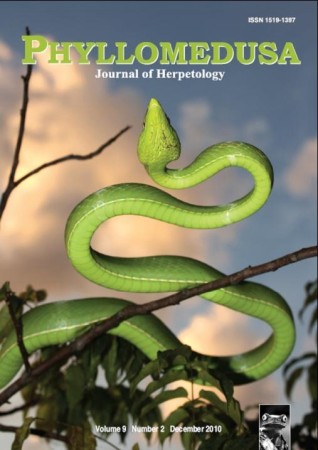Reduced foraging in the presence of predator cues by the Black Spiny-tailed Iguana, Ctenosaura similis (Sauria: Iguanidae)
DOI:
https://doi.org/10.11606/issn.2316-9079.v9i2p109-119Keywords:
Squamata, Iguania, Costa Rica, foraging, predator avoidance, predator-prey interactionsAbstract
The presence of a predator may have direct and indirect effects on the behavior of the prey. Although altered behavior may help prey avoid predators, it also can have a potential impact on critical activities such as foraging. Predator-prey interactions are routinely studied in laboratory-based experiments owing to the perceived difficulties of conducting such experiments in natural settings. We conducted an experimental study under field conditions in Palo Verde National Park in northwestern Costa Rica to assess behavioral responses of Black Spiny-tailed Iguanas (Ctenosaura similis) to the presence of predators and predator cues. Free-roaming iguanas were offered mango in designated areas in the presence of a predator (Boa constrictor), a predator cue (B. constrictor feces), and a control (no predator or predator cue). Results indicate that iguanas reduced their foraging efforts in the presence of both a predator and its cue.Downloads
Download data is not yet available.
References
Downloads
Published
2010-12-01
Issue
Section
Articles
License
All material originally published in Phyllomedusa belongs to Escola Superior de Agricultura Luiz de Queiroz - Universidade de São Paulo. All contents are under a license of Creative Commons BY-NC-ND.How to Cite
Farallo, V. R., Sasa, M., Wasko, D. K., & Forstner, M. R. J. (2010). Reduced foraging in the presence of predator cues by the Black Spiny-tailed Iguana, Ctenosaura similis (Sauria: Iguanidae). Phyllomedusa: Journal of Herpetology, 9(2), 109-119. https://doi.org/10.11606/issn.2316-9079.v9i2p109-119



 Impact Factor (JCR): 0.600
Impact Factor (JCR): 0.600 CiteScore: 1.0
CiteScore: 1.0